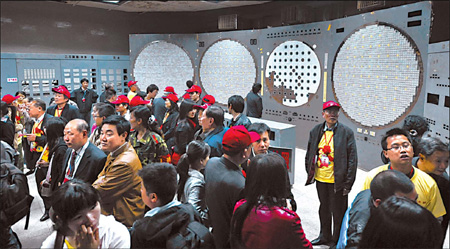Nuclear reaction to tourist attraction
The forgotten scientists who ran one of China's largest Cold War-era projects.
When Baitao was chosen as the site for a top-secret nuclear base in 1966, authorities literally wiped it from the map.
 |
|
Tourists look around one of the control rooms of the once top-secret nuclear base at Baitao, a remote town hidden in the mountains east of Chongqing. The project was halted in 1982. |
Over the following two decades, more than 60,000 soldiers and scientists were sent to this remote town hidden in the mountains east of Chongqing to work on one of the largest Cold War-era projects.
The project resulted in the construction of the world's largest man-made cave - 104,000 square meters, the equivalent of 20 football fields - but the military base was scrapped in 1982 before it was ever finished.
Today, Baitao is a major tourist attraction and is firmly back in the public eye. The same cannot be said for the experts who dedicated their lives to the multibillion-yuan mission.
"It was like the end of the world when the reactor project was shut down," said Pan Kaitai, 75, who was one of 5,000 staffers laid off when work on the base halted. "Everyone was worrying about how to survive in the remote mountainous area."
Each laid-off worker received three years' wages in compensation (the average monthly salary was less than 30 yuan in the 1980s). Although about 1,000 returned to their hometowns across China, the majority remained because of their hukou (resident registration) or family ties.
"Those people who had connections left but most of us stayed," said engineer Pan, who arrived in Baitao from Beijing in 1969. In the years immediately after the closure, scientists and other staff tried everything they could to make money.
Some tried to grow mushrooms in the damp cave but were defeated by an infestation of rats. Others removed every bit of aluminum alloy they could find to melt down and make cans for the nearby beer factory. The base's storehouses, which were designed to hold raw nuclear materials, were converted into car repair shops. Former nuclear technicians even resorted to setting up stalls to sell cakes and boiled eggs to villagers.
Most business ventures failed. "You can't image how frustrated we were," said Guo Zhenchuan, 70, a geological prospector who arrived in 1965. However, in the late 1980s, a large portion of the facility was successfully converted into a fertilizer plant, which is now the area's largest employer.
Many former workers at the nuclear plant found a position in the fertilizer plant. As the plant developed continuously, it provided the people who stayed with a pension and created job opportunities for the second and the third generation, according to Pan.
"We still live in the remote town, but the fertilizer plant built us the school, hospital and park," he said.
Sitting inside the foot of a mountain east of Wujiang River, a branch of the mighty Yangtze River, the Baitao base is shrouded by a thick, perpetual fog. The only noticeable feature is a 150-meter chimney that pokes out into the sky. All 19 entrances to the huge cave, which took 10 years and 740 million yuan ($108 million) to dig, and can withstand thousands of tons of explosives and an 8-magnitude earthquake, were bricked up until it was eventually declassified in 2002.
In April this year, the city authorities opened sections of the base to the public, and visitors can now pay 40 yuan for a tour of this once top-secret facility. However, staff at the entrance warned that, due to "confidential matters", both foreigners and the use of cameras are prohibited.
 0
0 







Go to Forum >>0 Comments